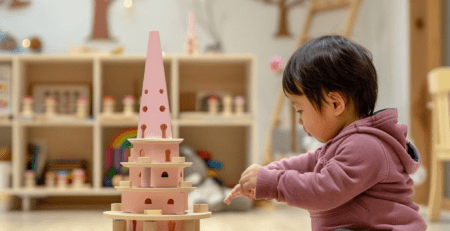
5
Why Consent Matters in Montessori Education
In a world where boundaries are often blurred and overlooked, the concept of consent holds immense significance. From the classroom to the playground, the Montessori approach emphasizes the importance of respecting and honoring each individual’s autonomy. In this article, we will explore why consent matters from a Montessori perspective, shedding light on the impact of this fundamental principle on a child’s development and the broader community. Join us as we delve into the intersection of education, empowerment, and respect, and uncover the profound implications of embracing consent in the Montessori environment.
Table of Contents
- Why Consent Is Integral in Montessori Education
- The Importance of Respecting Individual Autonomy in Montessori
- Promoting Empowerment and Self-Advocacy Through Consent
- Understanding the Role of Consent in Building a Culture of Respect
- Creating a Safe and Nurturing Environment Through Consensual Interactions
- Q&A
- Closing Remarks
Why Consent Is Integral in Montessori Education
Montessori education is centered around the idea of respecting the child’s autonomy and individuality, and consent plays a crucial role in upholding these principles. When children are given the opportunity to give or withhold their consent, it empowers them to take ownership of their own experiences and fosters a sense of agency. This is why consent holds a unique and integral place in Montessori education.
The Importance of Consent in Montessori
In traditional educational settings, children are often expected to conform to rules and directives without having a say in the matter. In contrast, Montessori education values the child’s voice and acknowledges their right to make choices about their own learning. By involving children in the decision-making process and obtaining their consent, educators can create a respectful and supportive environment where each child’s needs and preferences are honored.
- Empowerment: Consent empowers children to exercise their agency and assert their boundaries, which in turn builds self-confidence and self-advocacy skills.
- Respect: Respecting a child’s consent communicates the message that their voice matters and is valued, laying the foundation for positive social interactions and relationships.
- Autonomy: Giving children the freedom to consent or decline activities allows them to develop a sense of autonomy and responsibility for their choices.
Implementing Consent in Montessori Settings
Practicing consent in the Montessori environment involves creating opportunities for open communication and collaboration between educators and children. When introducing new activities or experiences, educators can involve the children by explaining the options available and allowing them to express their preferences. This approach fosters a sense of partnership and mutual respect, laying the groundwork for a positive and inclusive learning community.
| Approach | Impact |
|---|---|
| Explicitly seeking consent | Shows children that their input is valued and respected. |
| Offering choices | Encourages children to exercise autonomy and make decisions based on their interests. |
| Respecting boundaries | Contributes to a safe and supportive learning environment. |
The Importance of Respecting Individual Autonomy in Montessori
Respecting individual autonomy is a fundamental principle in Montessori education. This concept emphasizes the importance of allowing children to make their own choices and decisions, within a structured environment, in order to foster independence and self-confidence. Montessori educators believe that by respecting a child’s autonomy, they can better understand and meet their individual needs, ultimately leading to a more enriching and effective learning experience. In this post, we will explore the importance of consent in a Montessori perspective, and why it matters in the context of education and child development.
One of the key aspects of respecting individual autonomy in Montessori is the concept of consent. In a Montessori environment, children are encouraged to engage in activities and tasks that they are interested in, and are given the freedom to choose their own learning experiences. This not only allows them to feel empowered and in control of their own education, but also teaches them the importance of respecting others’ autonomy. By giving children the opportunity to consent to their activities, they learn the value of autonomy and self-determination, which are crucial skills for their personal and social development.
At its core, the Montessori method is built on the belief that children are capable of directing their own learning and development. By respecting and honoring their autonomy through consent, Montessori educators empower children to become independent, confident, and responsible individuals, setting a strong foundation for their lifelong journey of learning and growth.
Promoting Empowerment and Self-Advocacy Through Consent
When it comes to learning about consent in a Montessori setting, the focus is on promoting empowerment and self-advocacy. Montessori education emphasizes the importance of respecting the individual child and their autonomy, making it an ideal environment for teaching the concept of consent. By incorporating principles of consent into the classroom, Montessori educators can help children develop a strong sense of self and cultivate healthy relationships with others.
One of the key aspects of consent in a Montessori setting is the emphasis on developing strong communication skills. Children are encouraged to express their needs and desires clearly, while also learning to listen and respect the needs and desires of others. This focus on clear and respectful communication not only promotes the idea of asking for and giving consent, but also lays the foundation for building healthy relationships throughout their lives. By learning about consent in a supportive and nurturing environment, children can develop the confidence to advocate for themselves and make informed choices that align with their values and beliefs.
Understanding the Role of Consent in Building a Culture of Respect
In today’s society, the concept of consent plays a crucial role in fostering a culture of respect, particularly in educational settings such as Montessori schools. is essential for creating safe and supportive environments where children can thrive. By promoting the idea of consent from a young age, we can empower children to advocate for themselves and respect the boundaries of others.
Consent is not just about giving permission; it’s about respecting an individual’s autonomy and right to make choices about their own body and personal space. It is crucial to teach children about consent early on to help them develop a deep understanding of respect for themselves and others. In a Montessori environment, children are encouraged to explore and learn at their own pace, and this same philosophy can be applied to teaching the concept of consent. By incorporating the principles of consent into daily practices and interactions, Montessori educators can help children develop a strong foundation for understanding and respecting boundaries.
Creating a Safe and Nurturing Environment Through Consensual Interactions
Consent plays a crucial role in creating a safe and nurturing environment in a Montessori setting. At the heart of the Montessori philosophy is the belief in the child’s autonomy and respect for their individuality. When children are taught the importance of consent from a young age, they learn to respect themselves and others, and build healthy relationships based on mutual understanding and compassion. By emphasizing the concept of consent, Montessori educators promote a culture of safety, trust, and empathy that is essential for a child’s holistic development.
In a Montessori environment, children are encouraged to make choices and express their preferences freely, which helps them develop a strong sense of agency and confidence. Whether it’s asking for permission before using a material, seeking approval for a specific activity, or setting boundaries during a social interaction, children learn that their feelings and wishes are valid and respected. This emphasis on consensual interactions lays the foundation for positive relationships, teaches children to communicate effectively, and empowers them to assert themselves in a respectful manner. Ultimately, the practice of consent in a Montessori environment fosters an atmosphere of understanding, cooperation, and emotional safety, where children can thrive and reach their full potential.
Why Consent Matters in a Montessori Environment
– Promotes autonomy and respect for individuality
– Builds healthy relationships based on mutual understanding and compassion
– Encourages children to express their preferences freely and confidently
Creating a safe and nurturing environment is a fundamental aspect of the Montessori approach. By instilling the value of consent in children, Montessori educators empower them to become socially responsible, empathetic, and confident individuals who are capable of fostering healthy relationships. When children feel heard, understood, and respected, they are more likely to thrive and become active participants in their own learning journey. Tapping into the power of consent not only enriches the Montessori experience but also equips children with essential life skills that will serve them well throughout their lives.
Q&A
Q: Why does consent matter in a Montessori perspective?
A: In the Montessori approach, consent is crucial in fostering a child’s sense of independence, autonomy, and respect for others.
Q: How does the concept of consent relate to Montessori education?
A: The Montessori philosophy emphasizes the importance of allowing children to make choices and decisions about their own learning, environment, and interactions with others. This includes respecting their decisions about physical contact, activities, and personal space.
Q: What are some ways that Montessori educators teach children about consent?
A: Montessori educators teach children about consent by promoting clear communication, encouraging self-advocacy, and role modeling respect for boundaries and personal autonomy. They also involve children in decision-making processes and teach them to ask for permission before engaging in activities that may impact others.
Q: How does understanding consent benefit children in a Montessori environment?
A: Understanding and respecting consent benefits children in a Montessori environment by promoting a sense of agency, self-awareness, and empathy. It also fosters a culture of mutual respect and supports the development of healthy social and emotional skills.
Q: What role do parents play in teaching children about consent from a Montessori perspective?
A: Parents play an essential role in teaching children about consent by modeling respectful behavior, engaging in open communication, and actively involving their children in decision-making processes. By valuing their children’s autonomy and teaching them to respect the autonomy of others, parents support the development of healthy boundaries and interpersonal relationships.
Closing Remarks
Understanding and prioritizing consent from a Montessori perspective is vital in fostering an environment of respect, autonomy, and empathy. By prioritizing consent in all interactions and activities, we can empower children to advocate for themselves, establish healthy boundaries, and develop a strong sense of self-worth. In honoring and teaching the importance of consent, we can create a society that values and respects the autonomy and agency of every individual. Let us continue to advocate for the significance of consent in all aspects of our lives, and encourage others to do the same. Together, we can create a world where consent is not only valued, but deeply ingrained in our everyday interactions.










